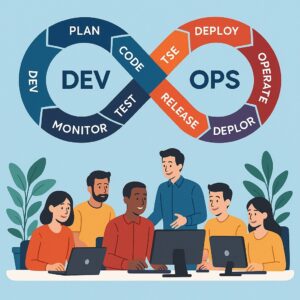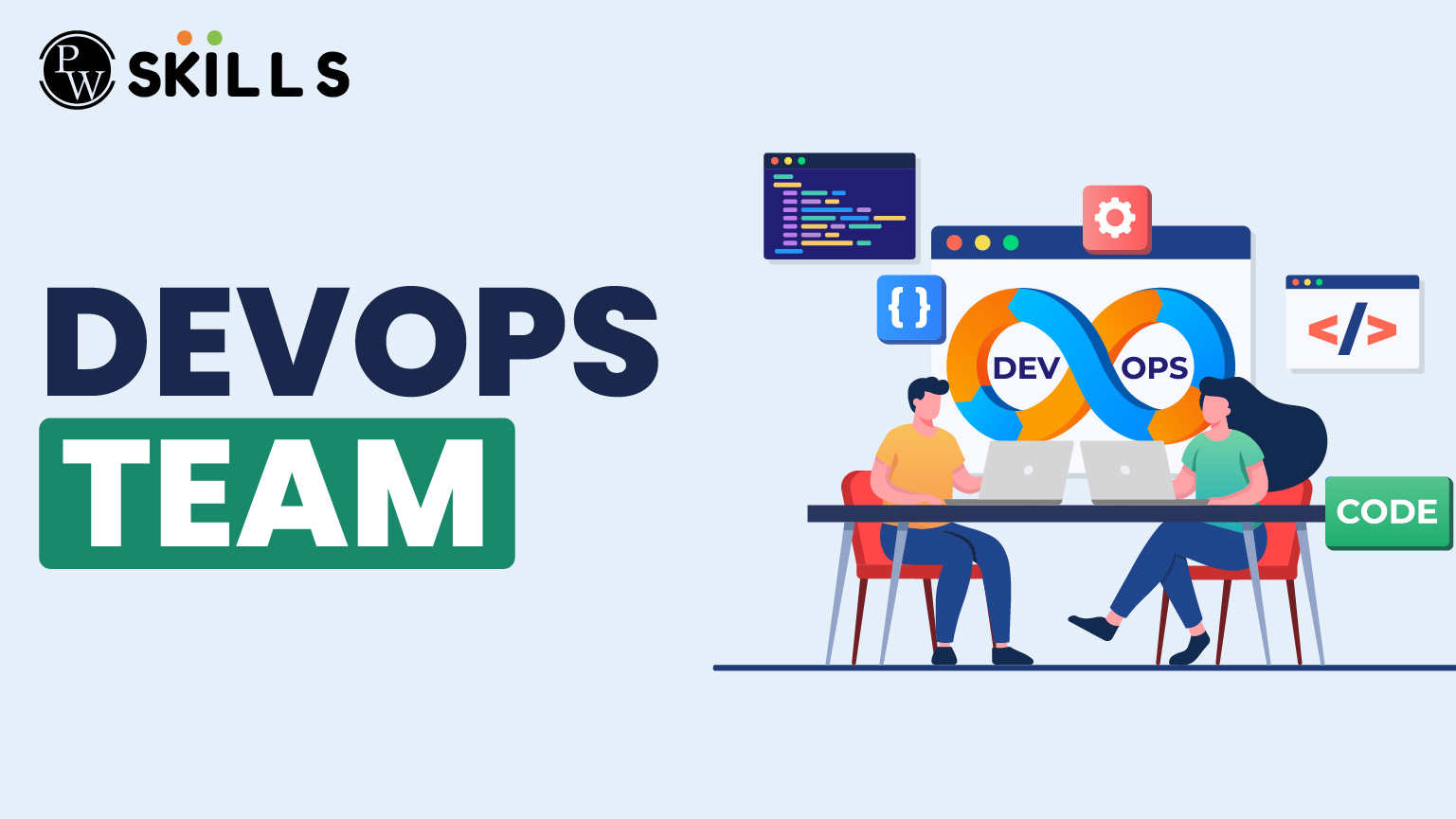DevOps team can change the way building and shipping software or applications is done at a company. They add speed, reliable performance, and a whole lot of sanity to the process. But it’s not just hiring smart people. It’s creating a space where devs and ops and everyone in between actually work together.
Maybe you’re a student trying to make sense of all the tech terms flying around or a working professional thinking, “Should I jump on this DevOps thing too?” Either way, you’re in the right place: Let’s take a chill and look at what a DevOps team really is, how it sets up, and what kind of stuff they actually do all day.
What is a DevOps Team?
Basically, a DevOps team is like the glue that holds software development and IT operations together in the context of software engineering. Instead of tossing the code over to the ops guys they work together to ensure that the software is built, tested, and released at speed and reliability.
It’s mostly culture, collaboration, and the breaking of those annoying silos. Generally speaking, a DevOps team includes developers, ops engineers, testers, security people, and all other persons involved in shipping a product and keeping it running smoothly.
How to Form a DevOps Team
Here it goes; there is nothing definitive about how to form a DevOps team because it really depends on the size of the company, its goals, and the seriousness of chaos at headquarters.
In smaller startups
All operations may lie under a single DevOps team handling everything: from automating deployments, debugging any errors.
Larger organizations
On the other hand, mostly embed DevOps within individual project teams or set a centralized platform team that builds tools other teams use.
DevOps-as-a-Service models
It is a bit like the renting of a team rather than building one.
Therefore, there is no one right way. The best DevOps team setup is the one that actually works for your team and makes life easier-not harder.
DevOps Team Structure
Inside a solid DevOps team, you’ve got a mix of different folks doing very-specific (and very crucial) things within the big picture of continuously-having-a-functioning-business.
- DevOps engineers are usually the MVP as they automate everything, build CI/CD pipelines, build and handle infrastructure, and everything else.
- Developers code and test but involve themselves in the release process now.
- Operations engineers ensure the servers don’t catch fire and stay robust. They run automated tests and flag bugs before becoming disasters, other than at the end.
- Security engineers provide security from Day 1.
Together, they keep the wheels turning. Everyone’s on the same page, or at least trying to be.

What DevOps Teams Perform?
- They build automated pipelines that do the other tasks from commit to production. So when a dev pushes changes, it automatically gets tested, reviewed, and deployed.
- They also manage infrastructure, but instead of clicking through the cloud dashboard, they write infrastructure as code, mostly using Terraform or Ansible.
- They also monitor applications using Prometheus or Grafana.
![]() Join Our Devops & Cloud Computing Telegram Channel
Join Our Devops & Cloud Computing Telegram Channel
![]() Join Our Devops & Cloud Computing WhatsApp Channel
Join Our Devops & Cloud Computing WhatsApp Channel
Different Types of DevOps Teams action Which Suits Best?
Let’s say you are going out to build a DevOps team from scratch. What kind of model should you go with?
Some companies go completely all out and have a fully integrated team. The devs and ops folks sit side-by-side working on the same goals. This is great for the small and nimble teams.
For example, bigger organizations would probably adopt the DevOps-as-a-Service model-whereby a central team would provide support and tools for other teams. Then there is the SRE (Site Reliability Engineering) model, which puts a heavy premium on automation and performance metrics. When uptime and reliability are most critical, this is a solid option.
Basically, every type has its advantages and disadvantages. The trick is to figure out what makes sense for your workflow and culture.
Why DevOps Teams Matter
A strong DevOps team can literally change how a company builds and ships software. They bring speed, reliability, and a whole heap of sanity to the process. But it’s not about hiring very smart people; it’s rather about creating a space in which devs, ops, and everyone in-between will actually work together.
If you are planning to dive into DevOps-surely be it as a student or switch in mid-career-it is an intelligent move. This field is broadening at lightning speed, and everyone is welcome. Just remember, the best DevOps teams do not possess the most sophisticated latest tools. They communicate well, adapt quickly, and never stop improving.

Joining a DevOps Team without Experience: How to Go About It
You do not have to worry if you have just started. You do not need years of experience to join a DevOps team. A DevOps course would provide you with a foundational base for coding, networking, and systems thinking. However, most importantly, you have to prove that you have the way of thinking associated with DevOps, such as collaboration, automation, and constant improvement. Joining an industry-relevant DevOps course is perhaps the wisest way to get into the field.
Also Read:
- DevOps Career Path: Your Career Guide For 2025
- The 20 Most Important DevOps Trends in 2025: Beat the Game
- Azure DevOps Explained: A Complete Beginner’s Guide (2025)
- 7 Effective Devops Books You Must Read to Become A DevOps Expert
Kickstart your career with PW Skills – DevOps & Cloud Computing Course
If you want to join a DevOps team and you want the skills that top companies really look for, go through the suitable DevOps course. It’s for students and working professionals who want to move fast and learn smartly.
The course does not just skim through theory but actually runs you through real-world use cases, live cloud environments, automation tools, and everything one needs to work in a high-performing DevOps team. Whether you’re preparing for the interviews or ready to get your feet wet in the first role, this course is a shortcut for getting there.
FAQs
Is coding necessary to be in a DevOps team?
Not always. While basic scripting helps, DevOps also needs people skilled in testing, security, cloud, and project coordination.
Can non-IT students join a DevOps team?
Yes, if you're willing to upskill through hands-on courses and practice, non-IT grads can break into DevOps too.
How long does it take to become DevOps-ready?
With consistent learning and projects, you can build DevOps skills in 3 to 6 months, especially with structured courses.

